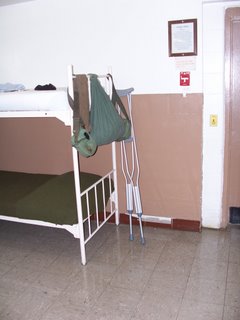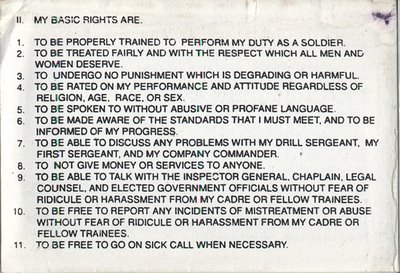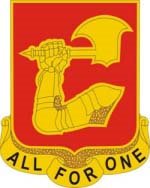Fort Sill's PTRP -- the Aftermath


As expected, I have begun to receive comments and emails that essentially dismiss the importance of the situation at Fort Sill, because the autopsy report shows that PFC Mathew Scarano died by oral ingestion of fentanyl in an amount 3 times that of the lethal dose. By inference, some of those comments suggest that this negates everything that has happened at Fort Sill's PTRP. I started to reply in-depth to one of the more conscientious anonymous commenters, and then realized that it really was time to write another post here. My apologies to Mathew Scarano's family while I talk about him as if he were just a generic and faceless trainee (as if there were such a thing):
Here is the 2nd comment from Concerned (located in Lawton, Oklahoma) and my response in italics:
-----------------------------------------------------------------------------
From: Concerned
To: ptrosss@gmail.com
Date: May 22, 2006 3:12 AM
Subject: [We Are All Volunteers in This Army] 5/22/2006 12:12:24 AM
Ms. DeV - I hold people accountable for their own behavior. There are hundreds of thousands of people in the USA who are prescribed narcotic medications for one reason or another. All are accountable for how they use it - they all don't need human monitors; just mature behavior on proper use of prescription medication. The majority have no problems.
How I see it, is that PFC Scarano's fellow trainees betrayed him by not telling the ones in charge about their knowledge about his behavior, because they were afraid of punishment for PFC Scarano, as you suggested. Punishment rather than death would have been more preferable. Wouldn't you agree? Doctors aren't in the unit to manage day-by-day matters, the cadre are. Shame on drill sergeants too who didn't ask questions about overmedicated behavior.
I beg to disagree -- we do know what killed PFC Scarano and that is by having three times the fatal limit of the pain medication in his body. The only way for that to happen is if he orally ingested his medication, just like others described. Look it up in a pharmacology textbook or talk to a pharamacist. His behavior. His choice. He was the one most responsible for his own death. Did other factors play a role; yes, how could they not.
I hear there have been a multitude of changes in the Ft. Sill PTRP program since you and others have brought to light particular abusive situations that existed. Kudos on your efforts.
The reason for my vocality is the seemingly grouping everything into one pot, when evidence suggests otherwise -- particuarly when it involves drug addictions. I have lived with family members who have had drug addictions and have even died from them. PFC Scarano's legacy at Ft. Sill should be to emphasis the need for increased knowledge about drug addiction and how fellow soldiers have an duty to them and commands in helping to identify and seek treatment for soldiers who need it. Something to think about from an anonymous okie.
-------------------------------------------------------------------------
<>Dear Anonymous Concerned Okie:
I, too, hold people accountable for their own behavior. Yet when that behavior occurs inside an institutionalized setting, it creates dynamics that can't be ignored. I don't have an agenda, except to bring as much info about the PTRP situations to light as possible.
What I believe that you aren't seeing is that it was common knowledge that PFC Scarano was overmedicated. That is, the Drill Sergeants saw him every day, and multiple members of the chain of command, in addition to his his peers. Of the two sets of observers, the PTRP-er who had been there longest (more than a year), and the eldest in age, (Pvt Howell) reported to CMHS (Community Mental Health Service) that Pvt Scarano was overmedicated, and not using his medication properly. This was reported by Pvt Howell to his own doctor, who was also PFC Mathew Scarano's doctor! Howell then reported that action back to his fellow trainees. That was the time for intervention by the authorities at Fort Sill, was it not? I don't understand why you aren't acknowledging that in fact, his situation had been reported. Perhaps you aren't aware that the CMHS is the authority at Fort Sill that prescribes and monitors many of the narcotic medications.
I am not doubting that Mathew Scarano ingested fentanyl. I have read about fentanyl until my eyes are crossed. I believe there is more to the story. When a key piece of evidence is missing, it is suspicious, no matter how you frame it. That piece of evidence is the medication log for Saturday. Mathew Scarano was typcally issued his patches, by his request (around the time of his death), after final formation at 6PM. In earlier months, he was given his medication earlier. Yet his mother spoke with him in the late afternoon of the night of his death (Saturday) and his speech was already slurred, which was unusual. Why was his speech already slurred? Apparently, there's no physical evidence in the autopsy report that Mathew Scarano ingested his patch. Even assuming that he was able to remove it from his mouth, after ingesting 3 times the amount required to cause death, how would he have disposed of it? Did a comatose Mathew Scarano get up out of bed and throw it away somewhere that the CID couldn't have found it first thing in the morning when the area was closed off for investigation? If they did find something, would it not have been included in the report? That would have been the easiest and simplest way to place the "blame" back on the deceased young man, would it not?
But this is all in the way of splitting hairs (albeit important) after the fact. Mathew Scarano was in the PTRP far longer than even the regulations at the time permitted him to be there. So were many others. The new regulations are an improvement if they are followed, but if the previous 6-month regulation had been adhered to, Mathew Scarano would have been at home months ago.
Assuming, for the sake of argument, that Mathew Scarano had become a prescription drug addict over his 13 months (minus one week return to training) in the PTRP at Fort Sill, consider this... He was 19 years old when he went in, and turned 20 and 21 in the PTRP. How many tools does someone that age have to deal with a growing addiction and no support? When your only in-person contact with your family is 2 weeks at Christmas, and a weekend once a month (and that only started THIS YEAR in February), what happens to you? When your entire world revolves around multiple Drill Sergeant's whims for 13 months, what happens to you? I'm not just speaking to PFC Mathew Scarano's state of mind, but of the entire PTRP, many of whom have had stays of longer than 6 months.
These 36-40 young men were confined to a small, designated area that included only their bay (quarters), dining hall, and a small workout area. The trainees were not allowed off-post passes, and for part of the time, they weren't allowed away from that designated area at all, even on-post. To stray outside the area of confinement meant that you were subject to arrest. Even within that area, you were subject to administrative action (like Article 15s) for walking alone. You could not go from one building to the next in your proscribed area without a companion. If you drank a Coke from a vending machine, you were punished. If you possessed a cellphone and got caught, you were punished. When you went to your doctor's appointments at the Medical Center on post, there was a Drill Sergeant telling to stop talking, to sit up, to wake up, etc. If you were working at your assigned job, you were subject to harassment by civilian employees. The boot camp scenario, that in the "real" Army world only lasts for 9 weeks, was perpetuated for more than a year for some trainees. Mathew Scarano was one of those trainees.
Add abuse on to this minimum security prison-like environment, and what happens? Fort Sill has carefully worded their statement to point out that verbal abuse in the form of cursing was going on... but cursing is the least of the verbal abuse that they endured. These young men were told day in and day out that they were worthless. They were told that they were lazy, were malingerers, and lying about being injured, even though they can't get into the PTRP without a valid medical diagnosis and test results (x-rays, mri, bonescan, etc.). Day in and day out they were told that they did everything wrong, even to having to re-scrape and re-wax a floor because it wasn't good enough. When they tried to go through their chain of command, they were ignored and threatened and laughed at. Once the information was public, they were threatened and verbally abused and laughed at again.
Even after PFC Mathew Scarano's death, when the CSM (Command Sgt Major) for Fort Sill's Training (in April) went on a tour through the PTRP, he wasn't familiar with their circumstances. Obviously, the chain of command didn't advise him. The CSM remarked, upon seeing a television, that the PTRP-ers shouldn't watch so much TV. He noticed that a pool table was pushed against the wall. He said that playing pool burned more calories than watching TV and suggested their TV time be curtailed and that they should play more pool. The Battery Commander didn't bother to tell the CSM that the pool cues and balls had been confiscated back in DS Langford's era because it was a "waste of time", and those items never returned. Nor did he bother to inform the CSM that TV time was confined to 2 hours in the evenings, and that with rare exceptions, the only programming allowed was military related documentaries or the news. The CSM also wasn't informed that the able PTRP-ers already did PT (Physical Training) twice a day, and weren't apt to be in danger of getting fat. No one has ever addressed the abuse situation directly with the trainees, to this day. They have to read it in the paper -- that is -- when they can get it.
Mathew Scarano exhibited all the symptoms of being overmedicated. His fellow trainees often assisted him to formation, and even insured that he was in the correct sleeping positions. At least one trainee reported suspected drug abuse to his doctor at CMHS. Their actions went above and beyond simply coexisting with him. As I reported in earlier posts, there were a significant number of trainees exhibiting a variety of mental health problems and symptoms of overmedication. I can't stress enough that a toxic environment was and is the problem at Fort Sill.
The climate of fear of reprisal that existed, that caused the trainees not to trust their chain of command, continues to exist at Fort Sill's PTRP even today. Until that is remedied, it doesn't take a crystal ball to predict there will be more incidents of various types. As late as April 18th, a young African-American trainee was refused his medications by a Drill Sergeant because he was late to the allocation. In the wee hours of the morning, that trainee had to be rushed to the Emergency Room. April 18th. Just a month ago. And this supposedly after the "climate" for abuse that is acknowledged by Fort Sill has supposedly changed. Why isn't that on the front page of a newspaper? Why, because most of the occupants of the PTRP and their families are still afraid to speak out.





 Help Skippy!
Help Skippy!



